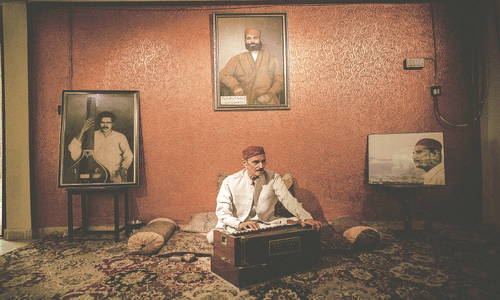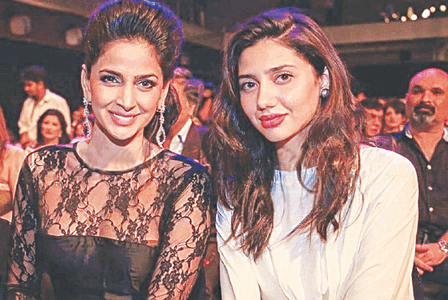
Azaan Sami Khan was already waiting for me at a restaurant in DHA, Karachi, when I arrived. I didn’t ask exactly for how long, since I was right on time — give or take five minutes.
He’s famished, he says, as we sit at the table on the cramped far end of the moderately loud diner (Azaan had politely asked the people sitting at that last table to move, saying something about triggering his OCD).
This isn’t the first time Azaan and I have met — our first interaction was on the set of Parey Hut Love (PHL), followed by a brief hello at the Lux Style Awards, and then at a private press gathering for PHL, where one of the PR people had politely nudged me to interview him. While we did speak, the conversation was more routine, and the circumstances unfair for the young musician, who is also on the verge of making his acting debut. Azaan is the music director of both PHL and Superstar — the latter, he also wrote and wanted to produce before it was taken up by Momina & Duraid Productions.
The day at the diner is different and relaxed.
With his sleeves rolled, and the top two buttons of his chequered shirt undone, Azaan slices and munches through two well-done, grilled patties (it wasn’t a steak per se, just two heavy burger patties). However, I learn that he has a far greater appetite for something else: success — though not at the expense of losing his individuality.
He feels he was literally raised to do something for the film industry. He’s already been a producer, composer, screenwriter, an editor and now he’s going to try his hand at acting. But Azaan Sami Khan doesn’t want his hunger for success to drown out his individuality
Azaan, son of actor-producer Zeba Bakhtiar and her ex-husband Adnan Sami Khan, is literally bred to be a part of the industry by his parents.
“I attended production meetings when I was eight,” he tells me as we go into his backstory. “My mum used to force me to edit after I came home from school — our production company was producing dramas at the time — and I used to hate doing that, but now it all makes sense.”
“Maybe I was raised to do something for this industry,” he muses.
Somehow learning the rhythm of editing, making the choices of keeping, trimming or doing away with frames of a video, has subconsciously made him a better composer.
“In my mind, I’m always editing when I’m making music. I can see how notes line up, and whether they work or not in a split second, and that’s only because I was forced to edit when I was young.”
We didn’t touch on his struggles with weight, or his relationship with his family (his mum did call twice, followed by a few messages). The interview, for me, is not about his past; I want to know what his future will be. The conversation, however, almost always boomerangs to his beginnings.
Other than being a prodigal musician, it’s no secret that Azaan also wants to be a successful actor — his debut will happen in the Momina Duraid production Patakh De, a romantic action film due out either in late 2020 or 2021. Another film, about which he is tight-lipped, is also in the works.
Other than being a prodigal musician, it’s no secret that Azaan also wants to be a successful actor — his debut will happen in the Momina Duraid production Patakh De, a romantic action film due out either in late 2020 or 2021. Another film, about which he is tight-lipped, is also in the works.
“I want to do television. In fact, I may do a drama sooner than expected,” he interrupts out of the blue.

Long-form dramas appeal to him at the moment as well. It is here that I realise that he is a very bright young man with a plan, and who is dead serious about what he wants to do. Acting in television will give him access to households who may have only heard his music.
It is crucial for the audience to know someone by face, and constant exposure in one well-made, consistently televised drama can do that for someone. The industry, on the other hand, knew him since he was born.
Azaan admits that being a star kid opened doors for him. “I’d be lying if I said that there wasn’t familiarity [with the film industry before starting off in this career]. I’d also be lying if I said that I wasn’t in my comfort zone,” he says.
“People here have seen me grow. They’ve seen me around them, going through phases. They’ve seen me in my weird teenage phase, my long-haired phase, my overweight phase, my ‘I wanna be an actor and I’m gonna lose my weight’ phase. Then my ‘I lost my weight’ phase. Okay, now-he’s-gonna-be-an-actor phase. Now-he’s-gonna-be-a-musician phase. All this happened very publicly, in front of the industry. I wasn’t the actor’s or musician’s son who studied abroad and suddenly came back to be an actor. I’ve been here all along,” he explains.
People may reach out to me, or listen to what I have to say right now. But if I give them one bad tune, or one bad performance, it would all be over,” he says. He learned this the hard way with Operation 021 — a production that went south in every way imaginable.
“It’s also very strange when you’re a kid growing up in the industry, and they almost believe that you know how to do certain things. Like [for instance, with music, people say], ‘give this to Azaan, he’ll do it.”
Letting out an exasperated breath, he adds: “Azaan has never done this before.”
I remember Mahira Khan telling me that she was one of first ones to believe in Azaan and Superstar. He had narrated the film to her while playing the piano four years ago. At that time, Azaan was gearing up to do Superstar with another studio. Then Momina Durraid (whom Azaan calls his godmother) stepped in to produce it.
She had already heard Superstar’s music, and asked Azaan to compose a song for Parwaaz Hai Junoon (PHJ). “Since I was the first one who was approached, I belted out a track as fast as I could,” he said.
Eventually, that one track led to four others. Then, before Parwaaz came out, another opportunity came out of the blue: Sheheryar Munawar called the young composer in for PHL. He and Asim Raza had heard Superstar’s soundtrack as well.

“I’m grateful to them. These opportunities could’ve been given to people far more talented,” he says. Azaan, however, is aware that he is one bad song or one bad performance away from failure.
“People may reach out to me, or listen to what I have to say right now. But if I give them one bad tune, or one bad performance, it would all be over,” he says.
He learned this the hard way with Operation 021 — a production that went south in every way imaginable.
“O21 was technically a failure of mine. It was something I didn’t want to do. I hated doing it, but having gone through that, it helped make me realise how things work in Pakistan.”
Even after producing O21, he was still training himself, assisting in Bollywood productions. The young man is simply in awe of the reverence people there give to the camera. Someone giving such devotion to their profession is very rare here, he tells me.
In one instance, when he was assisting on the set of the recently released film Kalank (starring Varun Dhawan, Alia Bhatt, Madhuri Dixit and Sanjay Dutt), cinematographer Binod Pradhan (Bhaag Milkha Bhaag, Rang De Basanti, Munna Bhai MBBS) reprimanded him for combing his hair in a reflection on a camera’s lens.
“Give your profession respect,” Pradhan told him. It was an eye-opening moment for him. Nothing has been the same since.
“I was watching Ed Sheeran on television, who said he was recording his second album — the first one was a huge hit — and he was like, ‘This had to be better than anything I have ever done’. So, somebody asked him ‘Why?’, and he said, ‘Because everyone is watching now’.”
For Azaan, after O21, PHJ, Superstar, PHL and now the upcoming Patakh De, the stakes are high. However, he gives a different reason for pushing himself. “I want to do the best I can, if not for any other reason, so I can go to bed at night thinking that whatever I have achieved today is better than what I had done yesterday.”
Published in Dawn, ICON, September 22nd, 2019



































